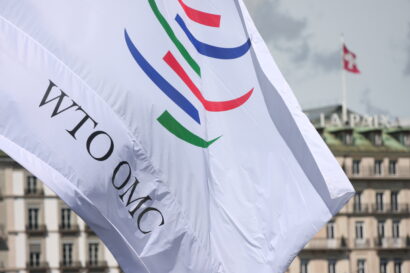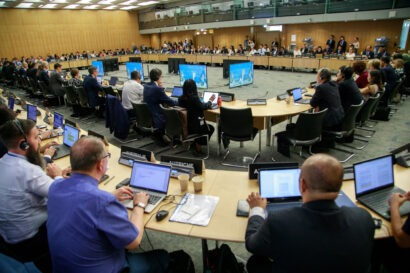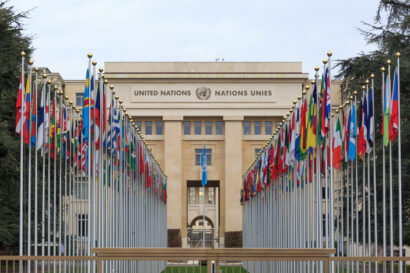A critical moment
Next week sees a critical moment in the reform of global corporate tax rules: the plenary meeting of the Inclusive Framework on Base Erosion and Profit Shifting (BEPS). The Inclusive Framework negotiations focus on the challenges created by the digital transformation of the economy, and African countries are participating in the negotiations. But can these negotiations address Africa’s longstanding inability to tax key sectors of its economy effectively?
To help us understand the issues at stake, it is worth considering the deliberations in two other bodies where their involvement is more longstanding. Last year marked 10th year anniversaries for both the Global Forum on Transparency and Exchange of Information for Tax Purposes (the Global Forum) and the African Tax Administration Forum (ATAF). Both organisations held events to celebrate their achievements in the last decade and discuss future challenges: ATAF in Kampala, Uganda and the Global Forum in Paris, France.
International processes should put greater focus on developing country concerns
The ongoing discussions at the Inclusive Framework were a constant reference point at the Kampala event, whose theme was “Innovation-digitalization and harnessing technology to improve tax systems.” Prof. Jeffrey Owens challenged the audience to reflect on whether extractive industries and commodities should really be part of the sectors carved out from the application of the new tax rules proposed under “Pillar One”, an issue discussed by Alexandra Readhead in this blog. Prof Owens asked if in the ongoing tax debates, Africa should consider the impact of digital transformation not only on sectors of the economy that are important now, but also on those that will be key for future generations. Without doubt, extractives and commodities will continue to be important sectors for Africa in the long term for generating foreign exchange, jobs, and tax revenues. Yet, the OECD’s BEPS work prior to the creation of the Inclusive Framework did not have much focus on these sectors: it was limited to some general prescriptive arm’s length rules under Actions 8 to 10, and one reference to commodity exchanges in pricing publicly traded commodities.
At the Global Forum event in Paris, the various speakers praised the political commitment made by the G20 leaders in 2009 to bring an end to bank secrecy. Multilateral tax co-operation such as through the Global Forum has led to the crackdown on safe havens for tax evaders, through automatic exchange of information on financial assets held by non-residents. This has helped countries claw back financial assets that would otherwise remain untaxed. Still, the Global Forum’s focus on tax evasion can only achieve so much while global tax rules, and the structure of the global economy at large, reflect developed countries’ interests. David Masondo, the South African Deputy Minister of Finance, hinted at the fact that the loss of resources by developing countries is not only due to illicit financial flows but also to the failure to re-align the powers between the global North and South.
Structural inequality in global value chains
The inequality in the global economy is evident in the example of the coffee industry in Uganda, which is Africa’s second largest exporter of coffee. Uganda earns close to 20% of its foreign exchange from this commodity alone, with about a quarter of households directly engaged in coffee production. Nine million Ugandans directly related with coffee production only earn about 7% of the final cup retail value of their produce. Six percent is retained by originating companies, while the remaining 87% goes to the roasters and other companies higher up in the value chain. This pattern of value attribution is not uncommon for the commodity and extractive sectors. As noted by the researcher Angus Elsby, the reason for this is not only because of the technical superiority and the higher value-adding activities undertaken by companies in developed countries but “more likely the result of severe imbalances in power relations between the key actors in coffee producing and coffee re-exporting countries.” According to Elsby, this leads to value capture as opposed to value creation.
Transfer pricing rules do not challenge the power imbalances in global markets: they replicate them in the distribution of the tax base. Some countries have chosen to make reference to prices on quoted commodity exchanges in determining arm’s length prices for commodities such as coffee, since these are sources of reference for independent traders as well. However, given that most of the commodity and extractive industry resources are traded by large multinationals, the involvement of independent parties can hardly affect the prices on the listed exchanges. Coffee farmers do not have the same market power.
While this may appear to be a fair trade discussion, it all has to do with Africa’s ability to retain a fair share of revenues from its natural resources. The higher these revenues, the more tax can be levied. As stated by Elsby,
“rather than taking the traditional approach of questioning how African countries can become more internationally competitive in advanced coffee processing activities, the key question is, instead, how to address the severe power imbalances between coffee producers and coffee buyers, processors and traders.”
Addressing power imbalances in global tax rules
If the Inclusive Framework is to be responsive to the priorities of developing countries, it is worth considering how to address this imbalance through global tax rules. Allison Christians and Laurens van Apeldoorn have considered exactly this question in a provocative paper on “taxing where value is created.” Various speakers at the Global Forum event suggested that it could act as a model for multilateralism to be replicated within other economic spheres. The pricing and taxation of flows from commodities and extractives is a key area that will determine whether developing countries can earn sufficient revenues to help them finance and realise the sustainable development goals. Achieving reform in this space will however require a great deal of political momentum.



